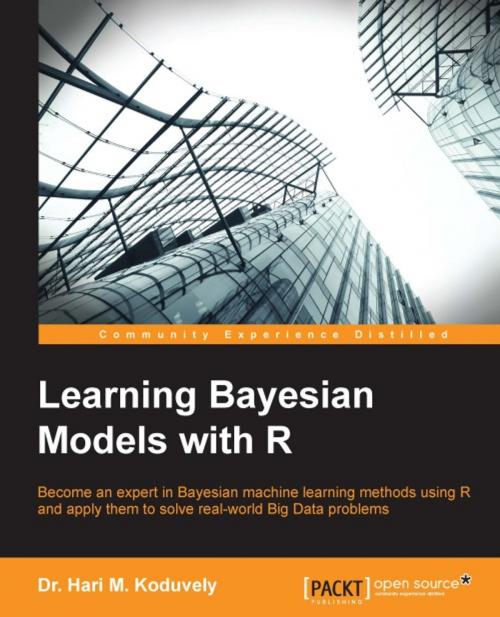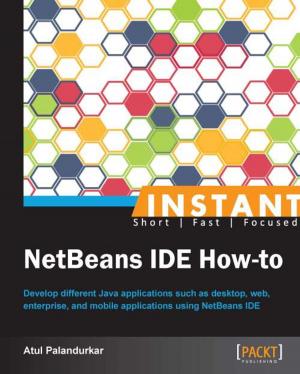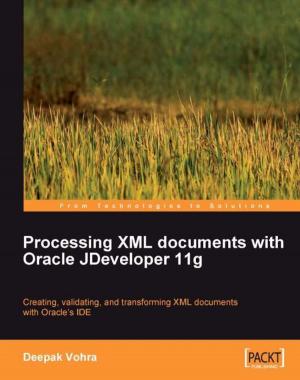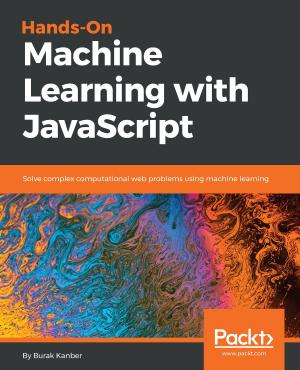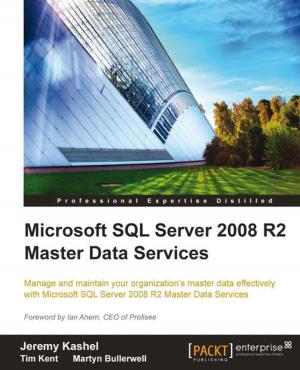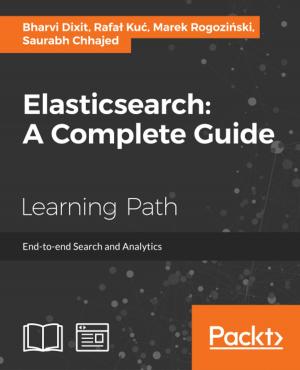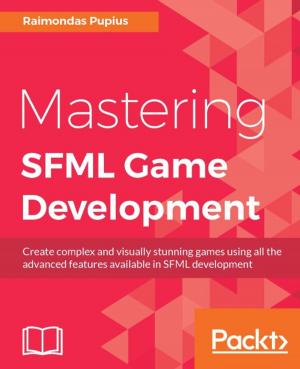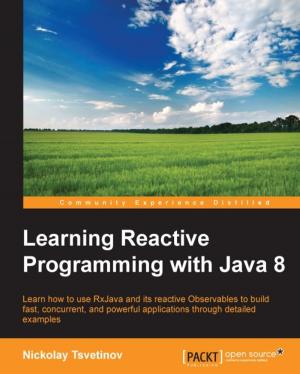Learning Bayesian Models with R
Nonfiction, Computers, Advanced Computing, Programming, Data Modeling & Design, Application Software, Business Software| Author: | Dr. Hari M. Koduvely | ISBN: | 9781783987610 |
| Publisher: | Packt Publishing | Publication: | October 28, 2015 |
| Imprint: | Packt Publishing | Language: | English |
| Author: | Dr. Hari M. Koduvely |
| ISBN: | 9781783987610 |
| Publisher: | Packt Publishing |
| Publication: | October 28, 2015 |
| Imprint: | Packt Publishing |
| Language: | English |
Become an expert in Bayesian Machine Learning methods using R and apply them to solve real-world big data problems
About This Book
- Understand the principles of Bayesian Inference with less mathematical equations
- Learn state-of-the art Machine Learning methods
- Familiarize yourself with the recent advances in Deep Learning and Big Data frameworks with this step-by-step guide
Who This Book Is For
This book is for statisticians, analysts, and data scientists who want to build a Bayes-based system with R and implement it in their day-to-day models and projects. It is mainly intended for Data Scientists and Software Engineers who are involved in the development of Advanced Analytics applications. To understand this book, it would be useful if you have basic knowledge of probability theory and analytics and some familiarity with the programming language R.
What You Will Learn
- Set up the R environment
- Create a classification model to predict and explore discrete variables
- Get acquainted with Probability Theory to analyze random events
- Build Linear Regression models
- Use Bayesian networks to infer the probability distribution of decision variables in a problem
- Model a problem using Bayesian Linear Regression approach with the R package BLR
- Use Bayesian Logistic Regression model to classify numerical data
- Perform Bayesian Inference on massively large data sets using the MapReduce programs in R and Cloud computing
In Detail
Bayesian Inference provides a unified framework to deal with all sorts of uncertainties when learning patterns form data using machine learning models and use it for predicting future observations. However, learning and implementing Bayesian models is not easy for data science practitioners due to the level of mathematical treatment involved. Also, applying Bayesian methods to real-world problems requires high computational resources. With the recent advances in computation and several open sources packages available in R, Bayesian modeling has become more feasible to use for practical applications today. Therefore, it would be advantageous for all data scientists and engineers to understand Bayesian methods and apply them in their projects to achieve better results.
Learning Bayesian Models with R starts by giving you a comprehensive coverage of the Bayesian Machine Learning models and the R packages that implement them. It begins with an introduction to the fundamentals of probability theory and R programming for those who are new to the subject. Then the book covers some of the important machine learning methods, both supervised and unsupervised learning, implemented using Bayesian Inference and R.
Every chapter begins with a theoretical description of the method explained in a very simple manner. Then, relevant R packages are discussed and some illustrations using data sets from the UCI Machine Learning repository are given. Each chapter ends with some simple exercises for you to get hands-on experience of the concepts and R packages discussed in the chapter.
The last chapters are devoted to the latest development in the field, specifically Deep Learning, which uses a class of Neural Network models that are currently at the frontier of Artificial Intelligence. The book concludes with the application of Bayesian methods on Big Data using the Hadoop and Spark frameworks.
Style and approach
The book first gives you a theoretical description of the Bayesian models in simple language, followed by details of its implementation in the R package. Each chapter has illustrations for the use of Bayesian model and the corresponding R package, using data sets from the UCI Machine Learning repository. Each chapter also contains sufficient exercises for you to get more hands-on practice.
Become an expert in Bayesian Machine Learning methods using R and apply them to solve real-world big data problems
About This Book
- Understand the principles of Bayesian Inference with less mathematical equations
- Learn state-of-the art Machine Learning methods
- Familiarize yourself with the recent advances in Deep Learning and Big Data frameworks with this step-by-step guide
Who This Book Is For
This book is for statisticians, analysts, and data scientists who want to build a Bayes-based system with R and implement it in their day-to-day models and projects. It is mainly intended for Data Scientists and Software Engineers who are involved in the development of Advanced Analytics applications. To understand this book, it would be useful if you have basic knowledge of probability theory and analytics and some familiarity with the programming language R.
What You Will Learn
- Set up the R environment
- Create a classification model to predict and explore discrete variables
- Get acquainted with Probability Theory to analyze random events
- Build Linear Regression models
- Use Bayesian networks to infer the probability distribution of decision variables in a problem
- Model a problem using Bayesian Linear Regression approach with the R package BLR
- Use Bayesian Logistic Regression model to classify numerical data
- Perform Bayesian Inference on massively large data sets using the MapReduce programs in R and Cloud computing
In Detail
Bayesian Inference provides a unified framework to deal with all sorts of uncertainties when learning patterns form data using machine learning models and use it for predicting future observations. However, learning and implementing Bayesian models is not easy for data science practitioners due to the level of mathematical treatment involved. Also, applying Bayesian methods to real-world problems requires high computational resources. With the recent advances in computation and several open sources packages available in R, Bayesian modeling has become more feasible to use for practical applications today. Therefore, it would be advantageous for all data scientists and engineers to understand Bayesian methods and apply them in their projects to achieve better results.
Learning Bayesian Models with R starts by giving you a comprehensive coverage of the Bayesian Machine Learning models and the R packages that implement them. It begins with an introduction to the fundamentals of probability theory and R programming for those who are new to the subject. Then the book covers some of the important machine learning methods, both supervised and unsupervised learning, implemented using Bayesian Inference and R.
Every chapter begins with a theoretical description of the method explained in a very simple manner. Then, relevant R packages are discussed and some illustrations using data sets from the UCI Machine Learning repository are given. Each chapter ends with some simple exercises for you to get hands-on experience of the concepts and R packages discussed in the chapter.
The last chapters are devoted to the latest development in the field, specifically Deep Learning, which uses a class of Neural Network models that are currently at the frontier of Artificial Intelligence. The book concludes with the application of Bayesian methods on Big Data using the Hadoop and Spark frameworks.
Style and approach
The book first gives you a theoretical description of the Bayesian models in simple language, followed by details of its implementation in the R package. Each chapter has illustrations for the use of Bayesian model and the corresponding R package, using data sets from the UCI Machine Learning repository. Each chapter also contains sufficient exercises for you to get more hands-on practice.
